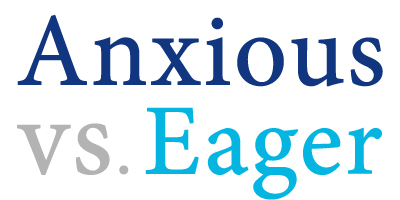There are many ways to enrich your writing. One of the easiest ways is by using adjectives. Adjectives describe or modify nouns. You wouldn’t want to use too many adjectives, or you could potentially make your writing ostentatious or ornate.
The words ostentatious and ornate above are adjectives. They describe a certain type of poor writing, and possibly provide an ironic example of such writing.
Anxious and eager are also adjectives. Both of these words describe a state of anticipation, but each should only be used in certain contexts. Continue reading to find out whether you should use eager or anxious to describe your feelings, depending on your perception of events that will happen in the future.
What is the Difference Between Anxious and Eager?
In this post, I will compare eager vs anxious. I will use each word in an example sentence. Plus, I will give you a helpful trick to use when you can’t determine whether you should use anxious or eager in your own writing.
When to Use Anxious
 What does anxious mean? Anxious is an adjective. It describes a state of heightened nervousness or worry. One is typically anxious about uncertain future events, or present circumstances that cause discomfort. Here are some examples.
What does anxious mean? Anxious is an adjective. It describes a state of heightened nervousness or worry. One is typically anxious about uncertain future events, or present circumstances that cause discomfort. Here are some examples.
- Briony was anxious to learn how the judges scored her performance in the singing competition.
- Bronwyn was anxious about having to walk home from the bar in the dark.
- Baxter felt anxious about his fiancé’s family tasting his cooking.
- Even by the standards of anxious sports fans, however, Babcock stands apart. –The Wall Street Journal
The word anxious has long meant uneasy, disquieted, as its corresponding adjective anxiety suggests. Anxious is best used in circumstances when both worry and anticipation is meant.
When to Use Eager
 What does eager mean? Eager is also an adjective. To be eager is to feel excitement or suspense about upcoming events. When a person is eager, he or she typically views an anticipated event in a positive or neutral light. See these sentences for examples:
What does eager mean? Eager is also an adjective. To be eager is to feel excitement or suspense about upcoming events. When a person is eager, he or she typically views an anticipated event in a positive or neutral light. See these sentences for examples:
- I am eager for this semester to be over, so I can relax.
- The Hittites were eager for the Israelites to be out of their lands.
- Once the team gained the lead, they were eager for the game to end.
- Still, some entrepreneurs are eager to test out the new market. –The New York Times
While anxious is used when there is a state of uneasiness in mind, eager is a better choice when no sense of uneasiness is attached to the situation.
Someone who is eager has a positive outlook on a situation in which he or she is enthused. Someone who is anxious has bleak outlook on the same situation.
Trick to Remember the Difference
 Eager and anxious are both adjectives that describe anticipation of the future. Pragmatics dictates that anxious should be used when perception of the future is negative; eager is more appropriate when perceptions are positive.
Eager and anxious are both adjectives that describe anticipation of the future. Pragmatics dictates that anxious should be used when perception of the future is negative; eager is more appropriate when perceptions are positive.
Trick to remember eager vs. anxious: One easy way to remember the difference is that anxious comes from the word anxiety, which implies mental distress. Since anxiety is negative, it will be easy to use anxious for situations involving a negative attitude about anticipated events, as well.
Summary
Is it anxious or eager? Anxious and eager are both adjectives, and they both deal with expectations for the future.
- Anxious describes unease or concern.
- Eager describes excitement and positive anticipation.
Since anxious is related to the word anxiety, remembering the proper usage case for this word should be a simple matter of remembering its meaning.
In summary, eager describes a state of positive anticipation, but anxious describes negative anticipation. Rather than damage your credibility with a poor choice of words, be sure to check this site when you have questions about writing and difficult words.
Contents
